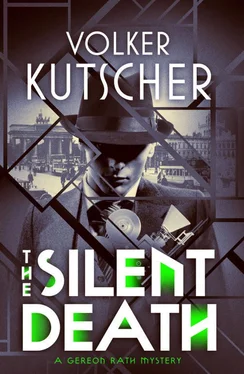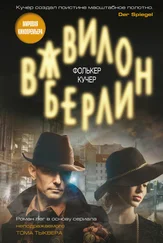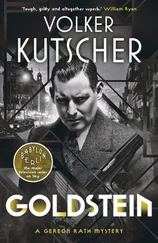‘Well then, how’s this ?’
Now… but she had hit him too hard! Well, Victor would live. It would make their quarrel seem all the more realistic.
Only now did she realise something wasn’t right.
There was no thunder.
Just a high-pitched, metallic noise, a soft pling . A small metal part must have fallen to the floor behind her.
She closed her eyes. No, please no! Not some stupid technical hitch! Not when she had been so good!
‘Shit,’ said Dressler. ‘Cu-ut!’
Although her eyes were closed she noticed the lighting change. Then it seemed a giant hammer struck her on the shoulder, the upper arm, the neck, with irresistible force, and when she opened her eyes again she found herself on the floor. What had happened? She heard a crack and sensed it had come from her body. She must have broken something. The pain gripped her so suddenly, so brutally, that for a moment everything went black. Above her she saw the cloths and steel trusses on the roof of the studio, and Victor’s horrified face staring at her before disappearing from her field of vision.
She tried to get up but couldn’t; something was burning her face, burning her hair, the whole of her left side. It was unbearable, but she couldn’t even turn her head. Something was pressing her to the floor, scalding her. She tried to escape the pain, but her legs wouldn’t obey, they wouldn’t move any more, no part of her body would. Like an army of mutineers, it refused every command. She smelt singed hair and scorched skin, heard someone screaming. It must be her own voice, and yet it seemed as if it was someone else, as if it couldn’t be her. Whoever was screaming and writhing and refusing to move was no longer a part of her, but a separate entity that could do nothing now but scream, scream, scream.
Victor’s face returned, not smirking anymore, but grimacing, eyes wide open and staring at her. His mouth was strangely distorted, not the face of his screen heroes, but resolute nonetheless. Only when she saw the water heading towards her, a shapeless jellyfish that seemed to hang forever in the air before reaching her, only then, in that endless moment, did she realise what he was doing and that this would be the last thing she ever saw.
Then there was only a glistening light that enveloped her completely. No, more than that: she herself was light, for a fraction of a second she was part of a luminosity never before experienced. Never before had she seen so clearly, and yet in the same moment she knew it was precisely this luminosity that would plunge her into darkness, irretrievably and for ever.
Sch. defended herself stoutly. Nevertheless, ‘Baumgart’ forced her onto her back and tried to pull down her breeches. In response to her threat that she would scream if he didn’t let her alone, ‘Baumgart’ sneered that she could scream all she liked, no one would hear. In the ensuing struggle, Sch. said she would rather die than bend to his will, to which ‘Baumgart’ replied: ‘ Then you shall die… ’
‘Would the gentleman like anything else?’
‘Then you shall die,’ he mumbled.
‘Pardon me?’
Rath looked up from his journal at a waiter standing at his table, a tray of dirty crockery in one hand. ‘Forget it,’ Rath said. ‘It’s not important.’
‘Can I bring you anything else, Sir?’
‘Not at the moment, thank you. I’m waiting for someone.’
‘Very good.’ The waiter cleared Rath’s empty coffee cup from the table and moved off, a penguin in a huff, balancing his tray through the rows of chairs.
The café was slowly filling up. Soon he would have to defend the free chair on his table. She was unusually late. Hadn’t she understood what this was about? Or had she understood and decided to stay away as a result?
She shouldn’t have telephoned him at the office. She didn’t get it. She had been trying to do him a favour, just as she was always trying to do him favours he’d never asked for. That was the only reason she’d wanted to go to the Resi with him. Surely he must approve, she had said, flourishing the tickets for the costume ball. He was a Rhinelander after all.
Fasching ! The word alone was enough, but that was what they called Carnival in Berlin, Fasching. Rath could guess what awaited him there: the obligatory costume, the obligatory wine, the obligatory good mood, the obligatory I-love-you, the obligatory we-belong-together-for-evermore.
The abortive telephone call had been a cruel reminder of what his relationship with Kathi really was: a New Year’s Eve acquaintance that had survived too long into the New Year.
He had met her just before midnight and they had toasted the coming year, both of them already somewhat worse for wear, before spontaneously locking lips. Next they had made a move for the punchbowl, where some clever clogs was holding forth, destroying everyone’s hopes for the new decade by claiming it wouldn’t really begin until 1931 since, mathematically speaking, 1930 was, in fact, the final year of the Twenties.
Rath had shaken his head and refilled their punch glasses while Kathi listened, spellbound by the mathematician’s missionary zeal. He actually had to drag her away, back onto the roof garden and into a dark corner where he had kissed her again while, all around them, people laughed and cried out as the fireworks whistled and banged in the night sky above Charlottenburg. He kissed her passionately until she let out a short, sharp cry of pain. Her lip was bleeding, and she gazed at him with such surprise that he began to apologise. Then she laughed and pulled him towards her once more.
She took it for passion, but really it was rage, an unspeakable aggression that was blazing its own trail, venting itself on an innocent party, later too, when she took him back to her little attic room and he spent himself, as if he hadn’t known a woman for a hundred years.
She called it lovemaking , and his rage she called passion .
She had been wrong about everything that came after too. Their love , as she called it, whatever existed between them, something he could find no name for, which had begun with fireworks and hopes for the future, had never had a future, not even at the start. He had sensed it even during those first kisses, as alcohol and hormones swept aside all reservations. He had known it at the latest by the next morning, when she had brought him fresh coffee in bed, and gazed at him adoringly.
At first he had been delighted at the smell of coffee, but then he had seen her lovestruck face.
He had drunk the coffee and smiled at her wearily.
That first lie was the first of many to come, sometimes without his meaning to lie, sometimes, indeed, without his even knowing that he was lying in the first place. With each day the lie grew bigger, and with each day more unbearable. He should have said something a long time ago.
Her voice on the line just now, her forced merry chatter about the Fasching ball, about arrangements, fun and fancy dress, and other trivial matters, had opened his eyes. It was time to put an end to it, but not over the telephone, and certainly not his work telephone. Rath had peered over at Gräf, as the detective leafed intently through some file or other, and without further ado asked Kathi to join him in Uhlandeck. So that they could talk.
‘What business do you have on the Ku’damm? We need to get to Schöneberg,’ Gräf had said, without looking up.
‘ You’re going to Schöneberg.’
Rath had handed his car keys to the detective, and hitched a ride to Uhlandeck. Kathi’s workplace was nearby. Even so, there was no sign of her.
Rath reopened the Kriminalistische Monatshefte, the journal he had been reading before the waiter came. Superintendent Gennat, his boss at Alexanderplatz, was reporting on the spectacular investigation in Düsseldorf, a series of gruesome unsolved murders, in which he and a few hand-picked Berlin colleagues were assisting the local CID. Rath had declined the opportunity to go with them, despite knowing that his refusal disappointed Buddha and would most likely stall his own career.
Читать дальше












